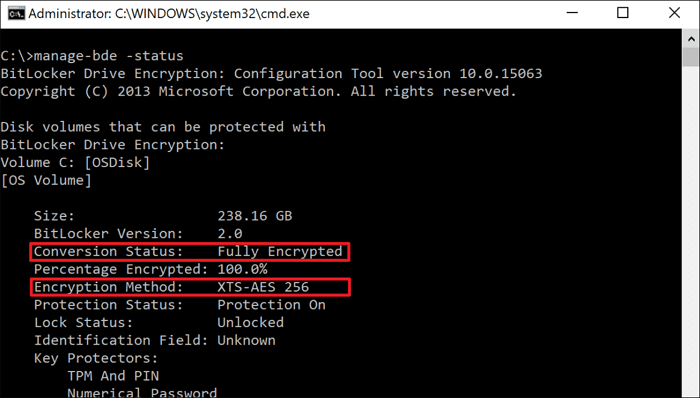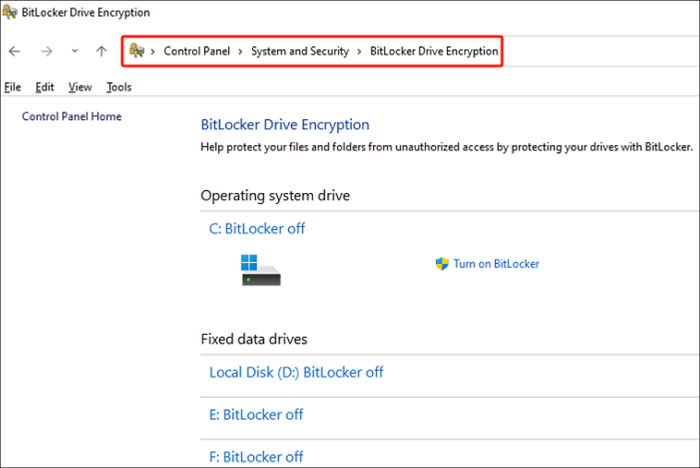Does BitLocker Slow Down SSD? Yes, up to 45%
BitLocker is an encryption feature that provides protection for entire drives. Generally, it's enabled by default on OEM computers with Windows 11/10. However, many users have reported that BitLocker is slowing down their SSD and affecting computer performance.
Does BitLocker slow down SSD? Read on. This article from Qiling will present a straightforward answer and solutions to the issue.
Does BitLocker Slow Down SSD?
They have conducted a series of tests on the impact of Bitlocker on SSD and drew the following conclusion about the performance ranking of SSD in three different scenarios:
hardware BitLocker (OPAL) / unencrypted (no BitLocker) > software BitLocker
When using the software-based BitLocker encryption, the processor keeps encrypting and decrypting data on the SSD during write and read processes, affecting SSD performance. In contrast, OPAL hardware encryption allows most SSDs to handle encryption and decryption processes directly, thereby causing a smaller impact.
- Notice:
- BitLocker Drive Encryption is available on Windows 11 and 10 Pro, Enterprise, and Education editions. Windows 11 and Windows 10 Home are not supported.
How to Solve BitLocker Slowing Down SSD
To solve the issue and improve SSD read and write speed, you should disable BitLocker or exchange to hardware-based encryption.
#1. Check BitLocker Encryption State
First, you should check the BitLocker status:
Step 1. Type in cmd in the Start menu search bar and run Command Prompt as administrator.
Step 2. Input manage-bde -status and hit "Enter" to access BitLocker Drive Encryption: Configuration Tool.
Step 3. Check the "Conversion Status" and "Encryption Method" tab of each volume to see if your SSD is encrypted.
- Fully decrypted in "Conversion Status" means BitLocker is disabled.
- XTS-AES in "Encryption Method" means BitLocker software encryption is activated.
- Hardware Encryption in "Encryption Method" means BitLocker hardware encryption (OPAL) is activated.

#2. Disable or Turn Off BitLocker Encryption
Now, if the SSD is using software-based encryption, you can choose to disable it or switch to hardware-based encryption:
Option 1. Disable BitLocker software encryption
Step 1. Enter Control Panel in the Start menu search bar and open it.
Step 2. Navigate to "Control Panel" > "System and Security" > "BitLocker Drive Encryption" and turn off BitLocker for the target drives.

Option 2. Turn on BitLocker hardware encryption (OPAL)
This option requires more steps and might be a little complex for some users. To switch to BitLocker hardware encryption, you should first ensure your SSD supports it. If OPAL is available for your SSD, then follow the steps below to continue:
Step 1. First, disable BitLocker software encryption on your SSD (source drive). You can refer to the steps in Option 1.
Step 2. After disabling BitLocker, clone the Windows to another drive as a backup.
Step 3. Then, enable the BitLocker hardware encryption on your source drive and then perform a secure erase on the SSD.
Step 4. Clone the backup Windows disk back to the source drive and boot up.
Step 5. Open the Group Policy Editor and turn on Bitlocker hardware encryption. The OPAL should work now. You can use the manage-bde -status command to check the status.
#3. Check SSD Performance and Improve SSD Speed
After unlocking BitLocker from your SSD, you can then check or test your SSD speed. To complete the process, you need a reliable disk and partition manager tool - Qiling Disk Master Professional.
First, Check SSD Performance (Read & Write Speed)
Step 1. Launch Qiling Disk Master. And click the download button to activate the "Surface test" feature under the "Disk management" section.

Step 2. Click on the drop-down box to choose the target drive, test data, and block size.

Step 3. Once everything is configured, click "Start" to begin the disk test. Then, you can see the Sequential read speed, I/O, and Delay data.

After this, you can view the performance test report and confirm if your SSD is running in a normal or average speed. If not, take the next guide to optimize its performance.
Next, Improve SSD Performance by 4K Alignment
Step 1. Go to "Toolkit" and choose "4K Alignment".
Step 2. Select the disk you want to align. Click the "Start" button.
By 4K aligning your SSD, the computer will obtain a significantly improved and faster reading and writing speed on the SSD.
This tool allows you to perform both cloning and secure erase tasks mentioned above. It also allows you to perform an SSD health check so that you can constantly monitor the disk's health.
Conclusion
Does BitLocker slow down SSD? The answer is YES, and the speed of SSD can be reduced by up to 45% with software-based encryption activated. But do not worry. This post also provides solutions to this problem to help you speed up SSD and improve computer performance.
If you find the information on this page helpful, feel free to share it with others to help them.
Does BitLocker Slow Down SSD FAQs
Below are some related questions and answers that you may be interested in.
1. Is there a downside for using BitLocker?
BitLocker encryption may slow down the system and affect PC performance because it occupies CPU and disk resources to handle data encryption and decryption. Additionally, BitLocker encryption is unavailable on Windows 11 and Windows 10 Home.
2. How do I remove BitLocker from my SSD?
To remove BitLocker from your SSD, you can:
- Run Command Prompt as administrator.
- Input manage-bde -status to check the BitLocker status.
- If it shows"XTS-AES" under "Encryption Method," input manage-bde -off C: to disable BitLocker. (Replace "C" with the letter of the target encrypted drives.)
- Restart your computer.
3. Does turning off BitLocker lose data?
No, turning off BitLocker will not cause data loss. It only removes the BitLocker encryption from your drives.